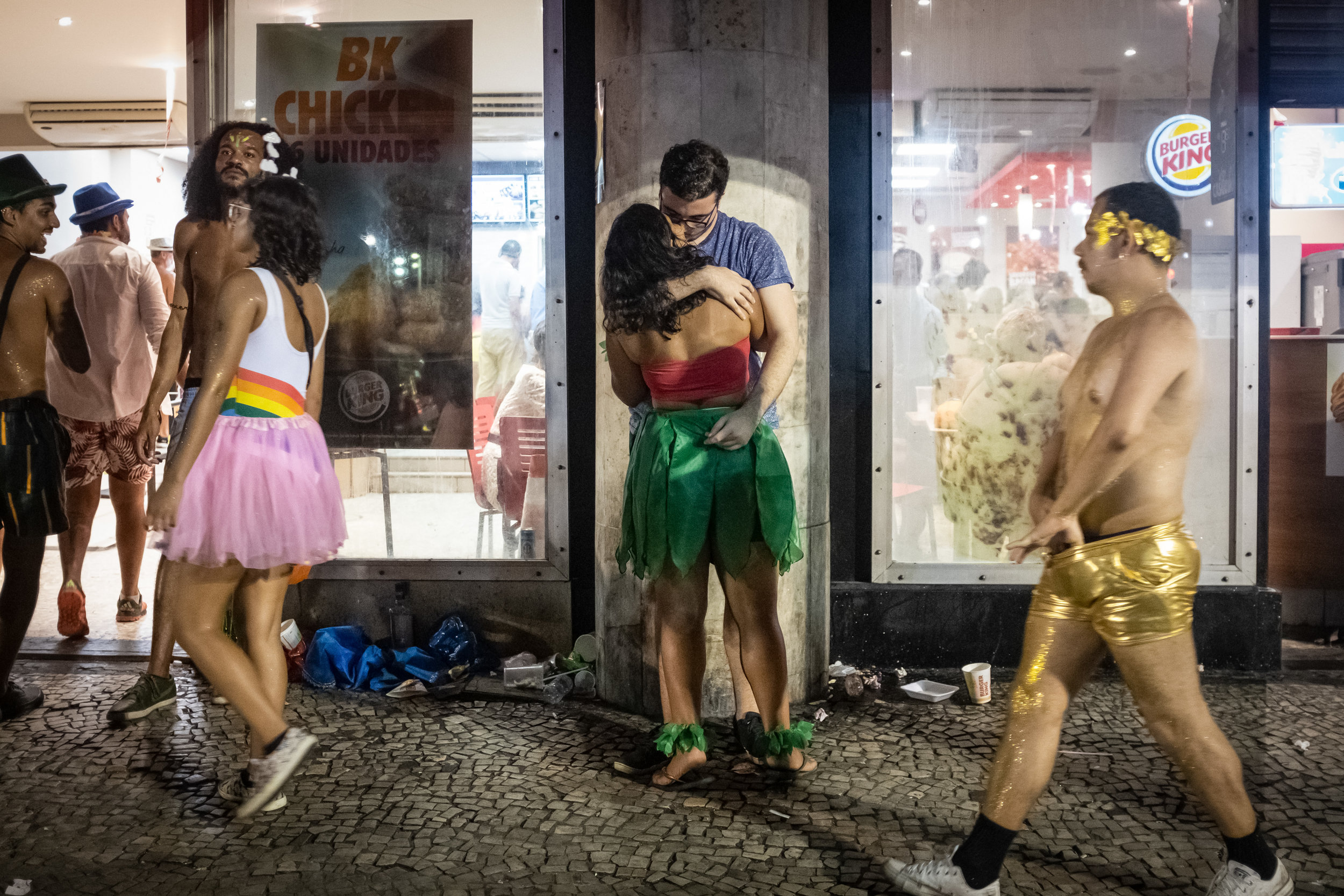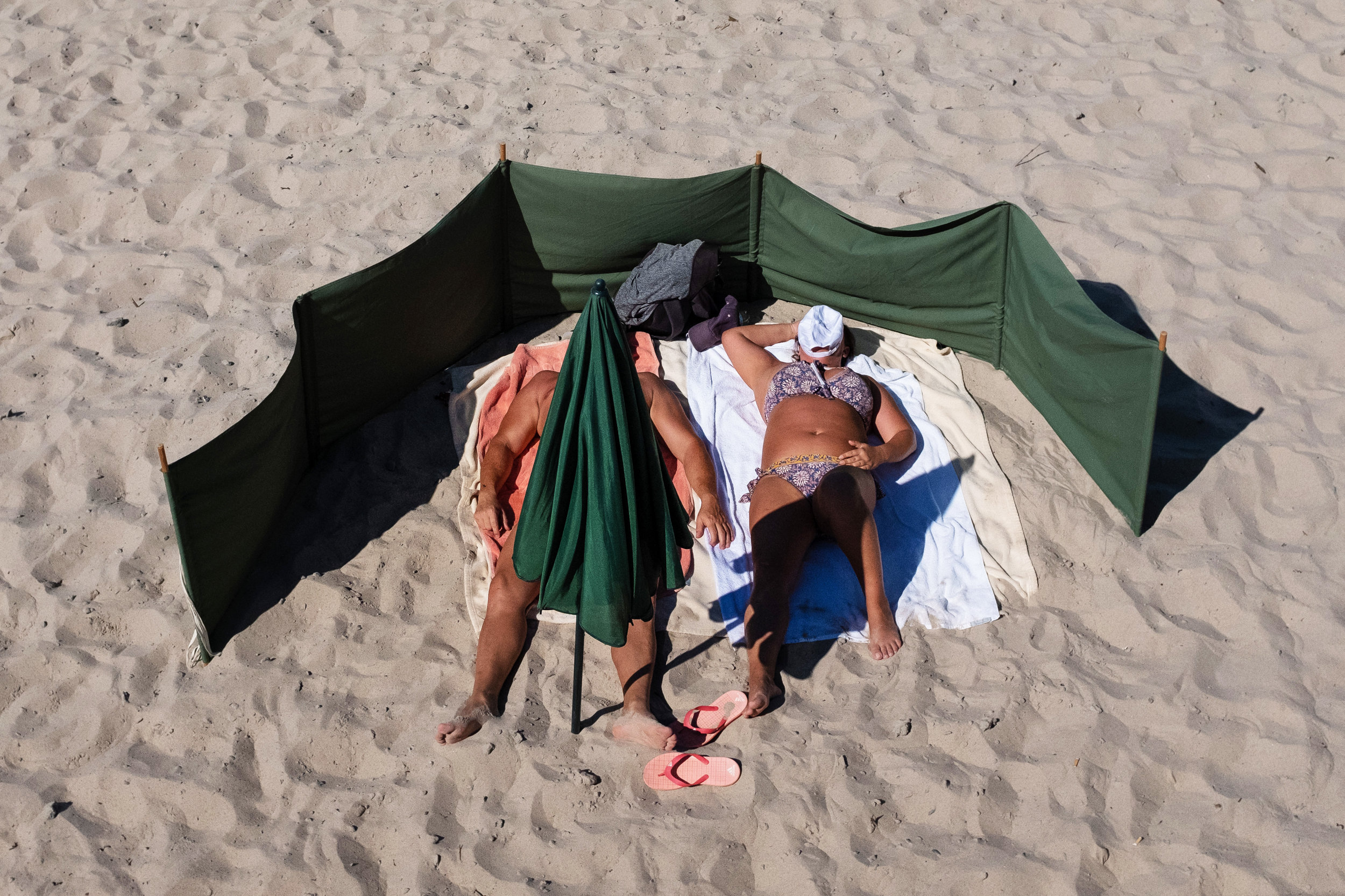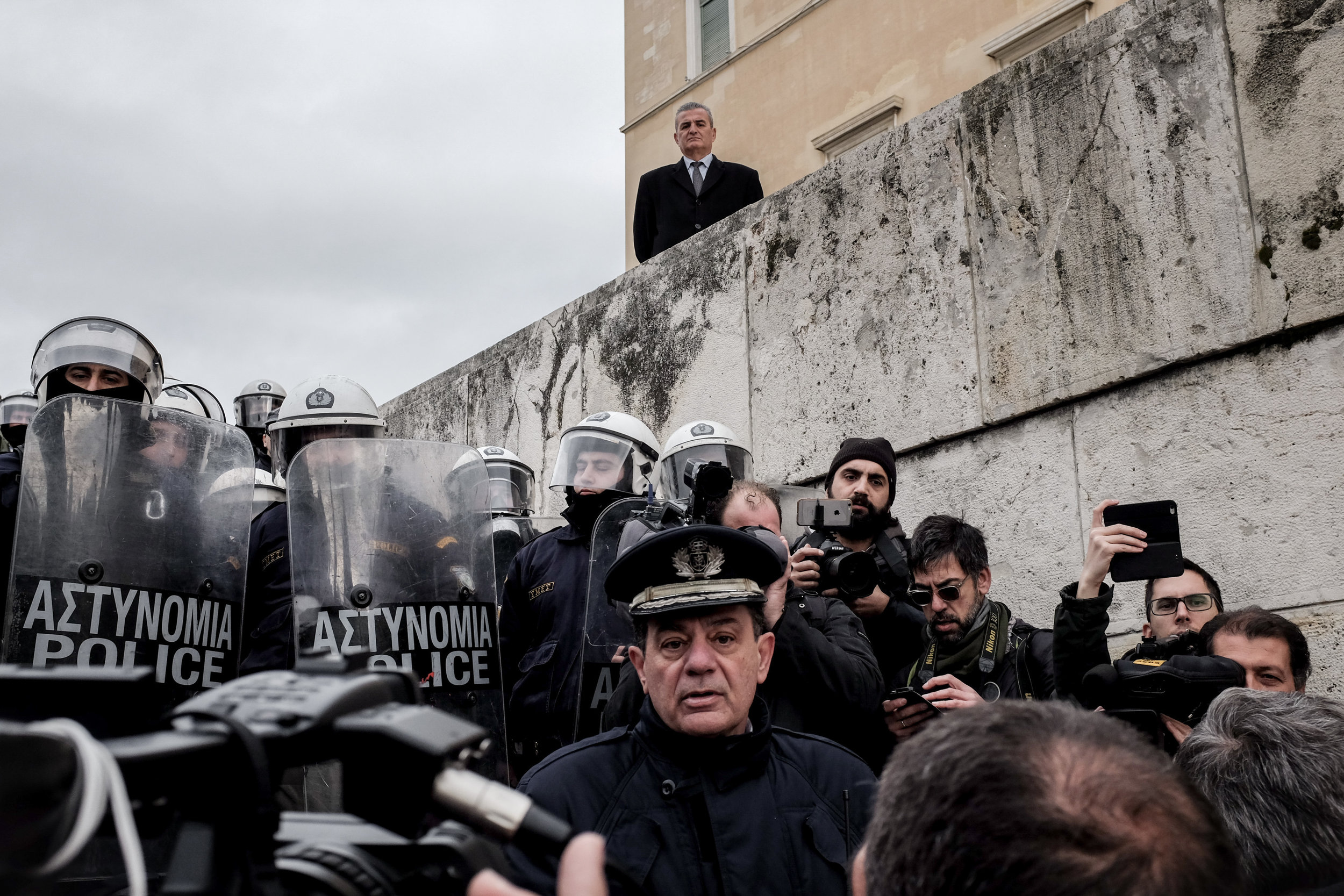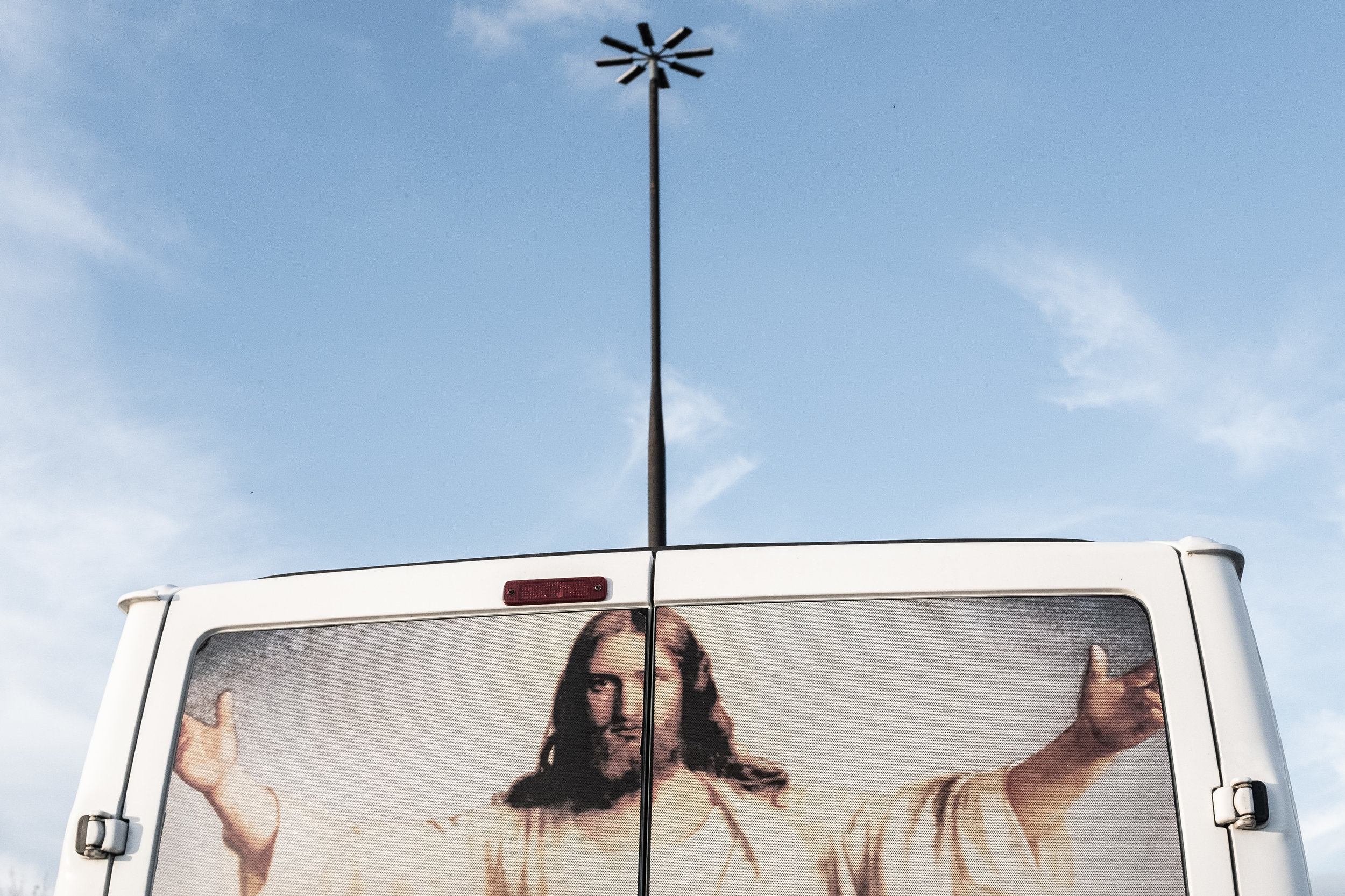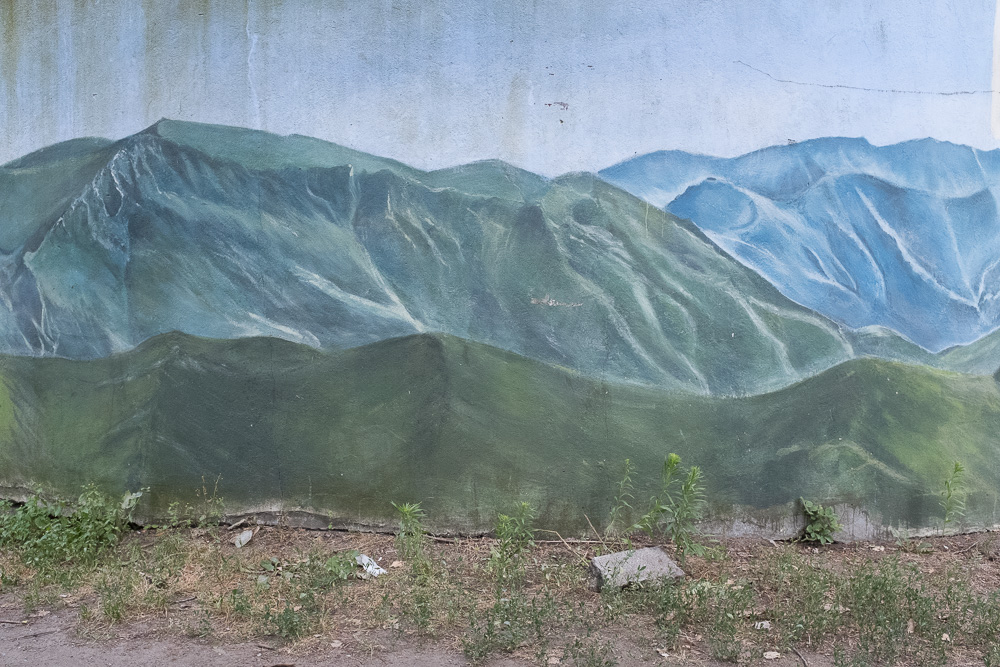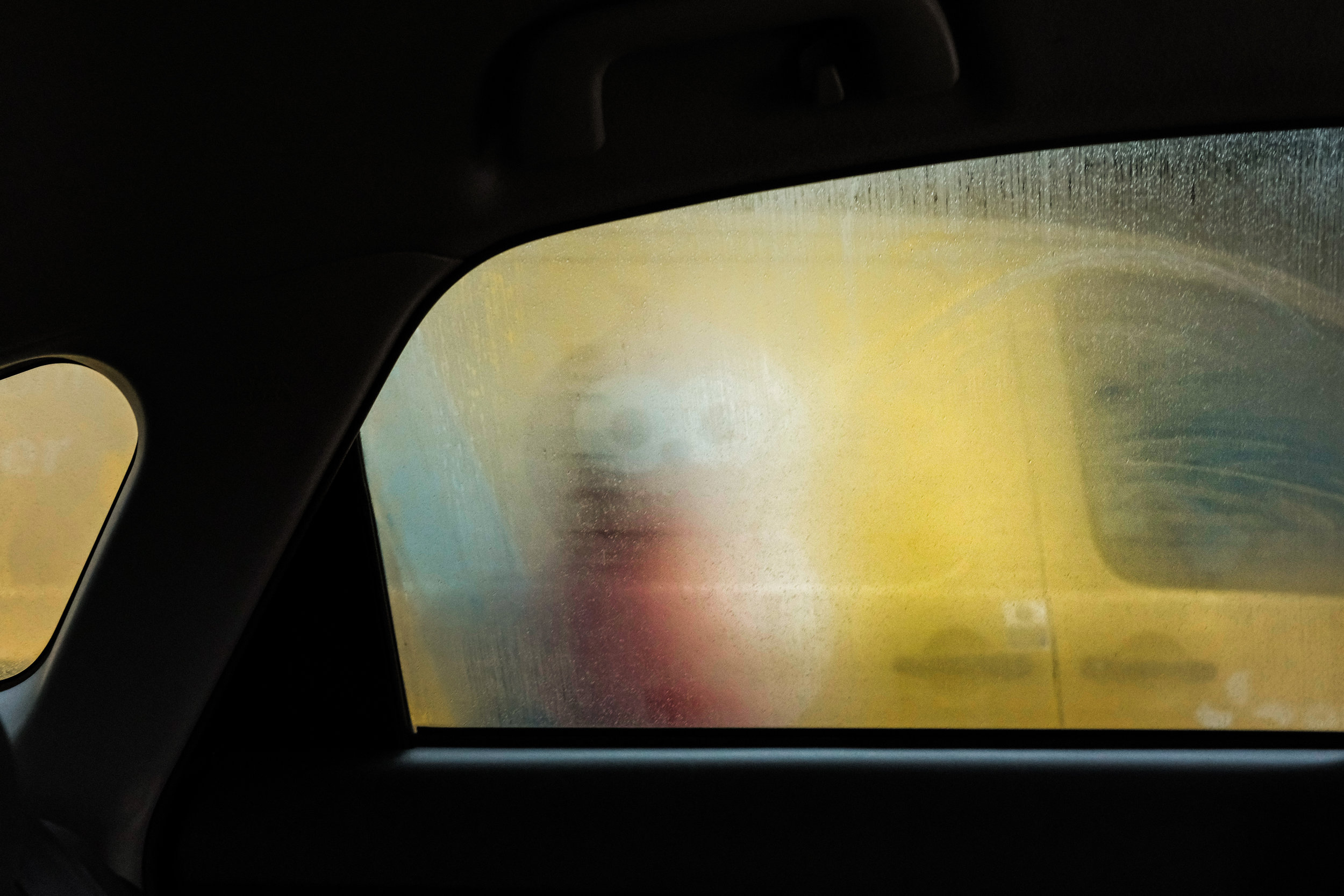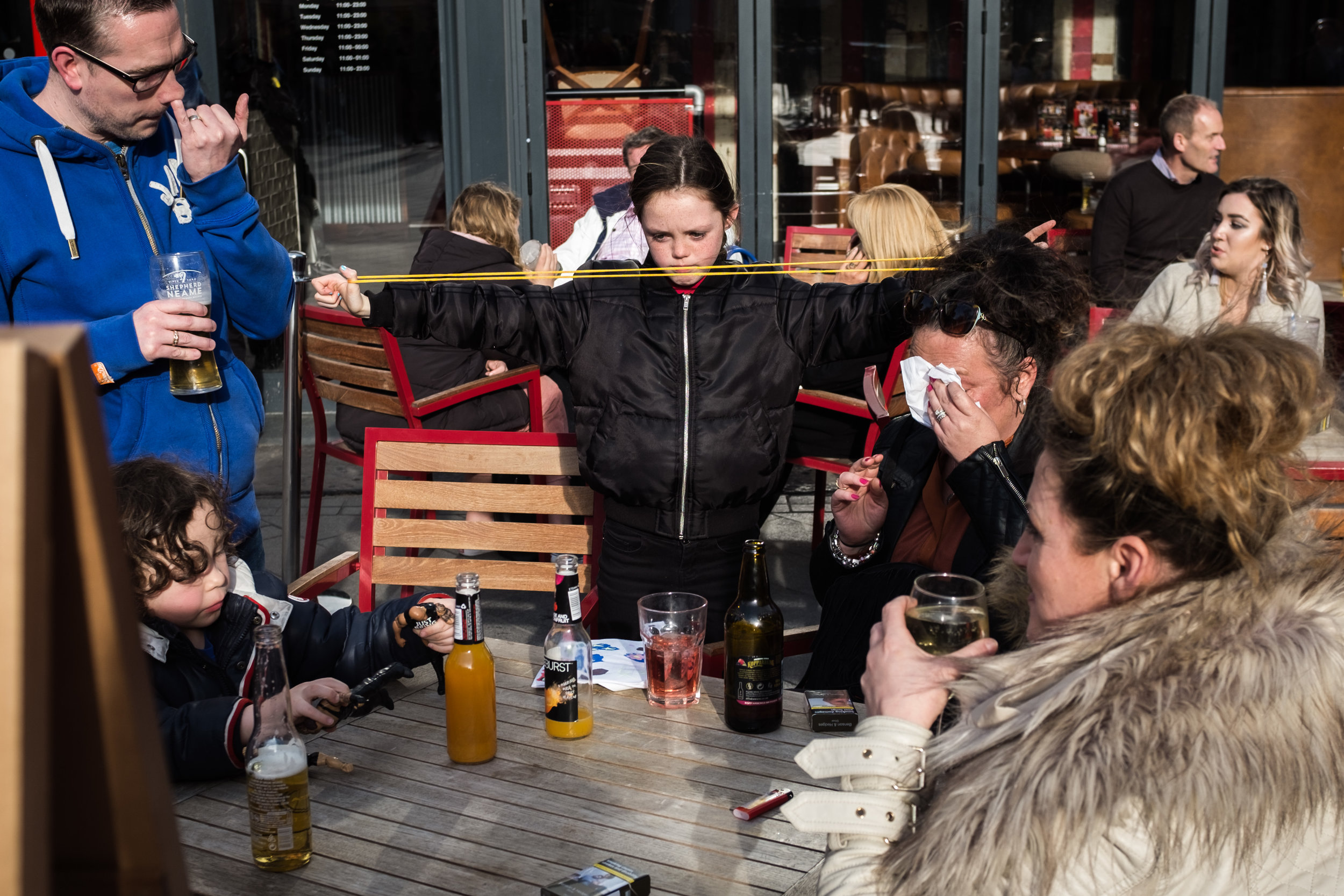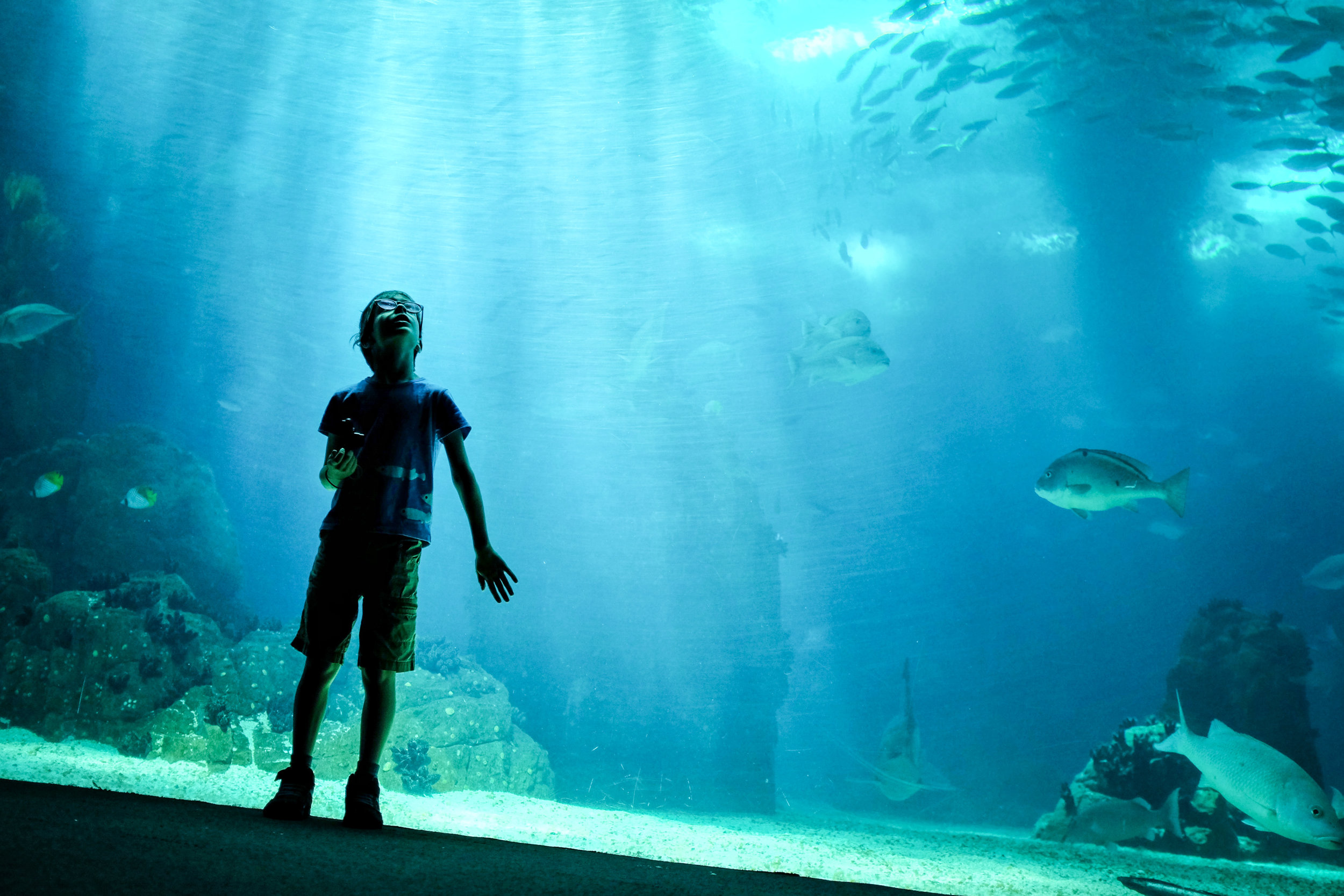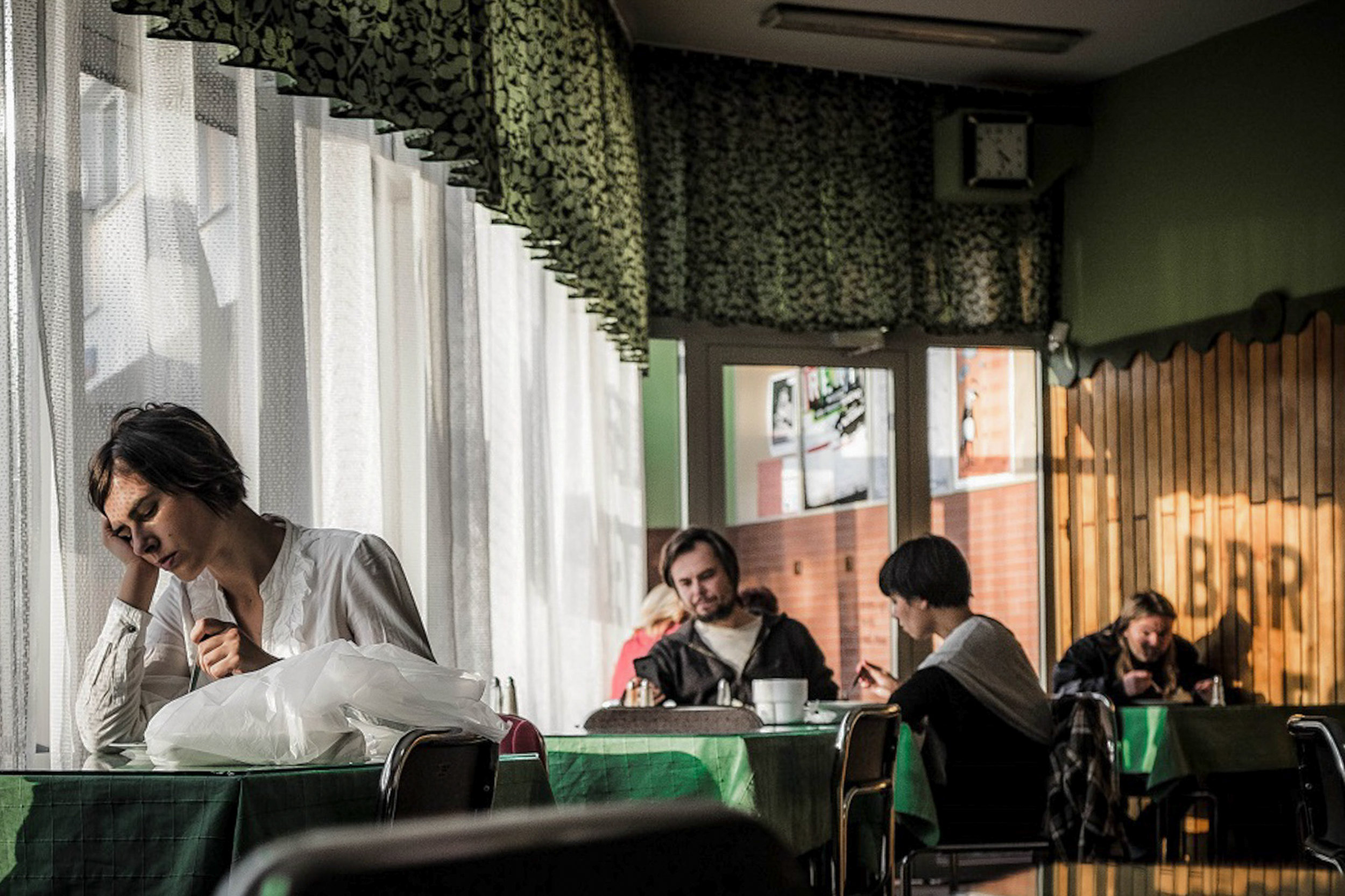Pelas ruas polonesas - entrevista com Katarzyna Kubiak
A fotógrafa polonesa Katarzyna Kubiak, de 35 anos, iniciou na fotografar aos 30 anos, idade em que muita gente já se considera velha para aprender qualquer coisa. Funcionária pública em Varsóvia, começou tirando fotos com o celular no dia a dia e em viagens, até vencer com uma delas um concurso. A qualidade do arquivo gerada pelo aparelho, porém, impediu que participasse da exposição com os vencedores e a levou a comprar uma câmera melhor.
Com o equipamento novo, passou a levar a fotografia de rua mais a sério. Fez parte de dois coletivos (Streetical Collective e un-posed) e se inscreveu em outros concursos. Venceu ou recebeu menções honrosas em quatro: International Photography Awards (2015), Moscow International Photo Awards (2016), Leica Street Photo (2016) e Human DOC Proclub Camera (2016). Teve fotos publicadas no World Street Photography Book, no Debuts (2016), na Street Photography Magazine, no Street Photography in the World Book vol. 1, na Eye Photo Magazine e na PhotoVogue, da Vogue italiana. Em paralelo, aos poucos, foi ganhando visibilidade nas redes sociais - hoje, no Instagram, tem mais de 20 mil seguidores.
Este ano, esteve no Rio de Janeiro, para o Carnaval. Apesar do receio em relação à violência na cidade, e dos alertas dados por cariocas na rua já por aqui, fotografou a festa.
Na entrevista a seguir, Katarzyna fala sobre sua trajetória, a experiência de fotografar no Brasil, a diferença de fotografar na Polônia, as dificuldades de conciliar a vida pessoal com a fotografia, a fotografia de rua e seus planos para o futuro como fotógrafa documental.
Quando você começou a seu interesse pela fotografia?
Comecei a me interessar por fotografia no final de 2014. Fotografava tudo que de alguma forma me interessava. Na época, eu tirava fotos com meu telefone celular. Por acaso, venci um concurso de fotografia, mas por causa da baixa qualidade da foto do meu celular, minha foto não pode fazer parte da exposição. Fui desclassificada e lamentei muito. Então, decidi comprar uma câmera.
O que mais atrai você na fotografia?
É difícil dizer, mas acho que é a beleza na fotografia. O tempo todo me surpreendo com algo em diferentes tipos de fotografia.
Por que você escolheu a fotografia de rua?
Eu não posso dizer que escolhi a fotografia de rua porque foi um processo natural. É apenas a forma que funciona melhor para mim.
Quais os maiores desafios na fotografia de rua? E o que você mais gosta?
Os desafios na fotografia de rua são o que eu mais gosto. Eu acho que é uma curiosidade em relação ao que você pode ver e como vai mostrar isso. O maior desafio é tirar uma foto que vai interessar outras pessoas. Produzimos tantas fotos hoje em dia que é muito difícil fazer isso.
Onde você costuma fotografar com mais frequência?
Eu normalmente tiro fotos durante minhas viagens, principalmente porque eu não tenho tempo para fazer isso todos os dias. Trabalhar e cuidar da minha filha toma a maior parte do meu dia. Recentemente, principalmente nos finais de semana, e com cada vez mais frequência, saio para tirar fotos em minha cidade natal.
Como você escolhe os temas que vai fotografar?
Eu tiro a fotos principalmente em minhas viagens. Então esses são normalmente os lugares que eu quero ver no país que estou visitando.
Você poderia descrever sua rotina quando está fotografando?
Eu acho que trato isso agora mais como uma forma de caminhar e tirar fotos. Eu nunca sigo uma rotina. Eu simplesmente ando e tiro fotos de tudo que acho interessante.
Muitas cenas em suas fotos são engraçadas. Quais são suas principais influências, em fotografia e em outras áreas que você acha que influenciam a sua forma de ver?
Ao contrário do que você notou, eu gosto mais de fotos visualmente bonitas do que das engraçadas. Acho que é por causa do meu amor pelo cinema. Acho que explica muito sobre como eu fotografo.
Poderia citar outros fotógrafos de rua de sua geração que você admira, mas que não necessariamente referências para você?
Eu constantemente descubro novos excelentes fotógrafos e não seria possível eu nomear todas as pessoas que eu admiro aqui. Eu também não sou boa em lembrar nomes, eu tenho mais facilidade de identificá-los pelas fotos que tiram.
Você integra dois coletivos de fotografia. Como isso ajuda você?
Eu não estou em nenhum coletivo no momento, mas não estou excluindo a possibilidade. Há algum tempo atrás, eu senti que fazer parte dos coletivos não me trazia nada e decidi sair. No entanto, estou sempre aberta para novas ideias e, se decidir que vale a pena investir tempo em algo, ou em minhas atividades, certamente foi fazê-lo.
Eu vi que você esteve no Brasil. Acho que foi no Carnaval. Como foi sua experiência fotografando aqui?
Sim, eu estive no Brasil este ano. Eu queria realmente ver com os meus próprios olhos como o mundialmente famoso Carnaval se parece. Eu li sobre a situação perigosa no Rio de Janeiro desde o começo, mas eu não sabia o que esperar. Há países mais e menos seguros na Europa, mas não há comparação, de forma alguma. É algo completamente diferente. Na Europa, eu não preciso me preocupar com a câmera, posso andar com ela na mão e nada vai acontecer. A primeira vez que eu saí do hotel, as pessoas na rua vieram até mim e me disseram para esconder a câmera, porque de outra forma alguém iria roubá-la. Isso dificultou muito para mim tirar fotos, porque todos estavam prestando atenção em mim. A maior parte do tempo, provavelmente, imaginando como alguém poderia ser tão estúpido de andar com uma câmera à mostra. No Brasil, definitivamente você tem que ter os olhos na nuca e ter mais cuidado do que na Europa. Felizmente, não passei por nenhuma situação desagradável e lembro do Carnaval como uma excelente experiência. Claro, depois de alguns dias carregando minha câmera na mochila, que eu levo à minha frente. Eu tirava a câmera, fazia as fotos e escondia de volta. Foi o meu jeito de fotografar no Rio.
Quão diferente foi de tirar fotos nas ruas da Polônia? Como as as pessoas normalmente reagem a fotógrafos de rua na Polônia?
Como eu escrevi, o Rio é muito perigoso. Mas, ao mesmo tempo, as pessoas era amigáveis e maravilhosas, muito abertas. Isso as torna diferentes das pessoas na Polônia, que são bastante fechadas e inacessíveis. Certamente, é algo que reflete nossa cultura e história. Somos mais desconfiados. E isso também tem efeito quando se tira fotos na Polônia. Frequentemente, as pessoas reclamam, prestam atenção e perguntam porque estou tirando fotos delas.
Você está trabalhando em algum projeto atualmente?
Infelizmente, no momento não estou trabalhando em nenhum projeto, embora não me faltem ideias. Por razões pessoais, eu não tenho tido tempo para realizá-las. Em um futuro próximo, eu vou me focar em aprender coisas novas em fotografia.
Que equipamento você usa?
Eu uso uma Fuji X100F
Como você vê a sua fotografia hoje? Como você se sente em relação ao seu trabalho? O que você gostaria de explorar mais? O que você pretende deixar para trás?
Eu tenho certeza de que minha abordagem na fotografia de rua mudou. Eu não levo mais tão a sério como levava antes. Ainda me divirto muito com e sou apaixonada pela prática, mas agora vou tentar me focar em fotografia documental e, como escrevi antes, quero aprender coisas novas.
Que fotografias do seu portfólio você gosta mais?
Eu acho que realmente gosto de fotografias com multiplos planos, mas eu também presto muita atenção à estética. Eu gosto quando há várias coisas acontecendo e o enquadramento está próximo.
O que você sugeriria para quem está começando a tirar fotos?
De fato, você pode dizer que eu também estou no começo dessa jornada o tempo todo. Alguns anos de fotografia não me tornam uma especialista nessa áreas. No entanto, eu gostaria que as pessoas não prestassem tanta atenção às opiniões do outros. E, por outro lado, não tivessem ciúmes do sucesso dos outros.
Through the Polish streets - interview with Katarzyna Kubiak
Polish photographer Katarzyna Kubiak, 35, started shooting at the age of 30, when many people already consider themselves old enough to learn anything. A civil servant in Warsaw, she started taking pictures with her cell phone on a daily bases and on trips, until she won a contest with one of them. The quality of the file generated by the device, however, prevented her from participating in the exhibition with the winners and led her to buy a better camera.
With the new equipment, she took street photography more seriously. She was part of two collectives (Streetical Collective and un-posed) and entered other contests. She has won or received honorable mentions in four of them: International Photography Awards (2015), Moscow International Photo Awards (2016), Leica Street Photo (2016) and Human DOC Proclub Camera (2016). Her photos have been published in the World Street Photography Book, Debuts (2016), Street Photography Magazine, Street Photography in the World Book vol. 1, in Eye Photo Magazine and PhotoVogue by Vogue Italy. In parallel, she has been gaining visibility on social networks - on Instagram, se has now more than 20 thousand followers.
This year, she went to Rio de Janeiro for Carnival. Despite fears about violence in the city, and warnings given by cariocas on the streets, she photographed the party.
In the following interview, Katarzyna talks about her career, the experience of taking pictures in Brazil, the difference in photography in Poland, the difficulties of balancing personal life and photography, street photography and her plans for the future as a documentary photographer.
When and how did your interest for photography started?
I started to be interested in photography at the end of 2014. I photographed everything that somehow interested me. I was taking pictures with my mobile phone at the time. By chance, I won a photo contest, but because of the very poor quality of the photo from my phone, my photo could't take part in the exhibition. I was disqualified and I was very sorry. Then I decided to buy a camera.
What attract you most in photography?
It's hard to say, but I think beauty in photography. All the time I am surprised by something in different types of photography
Why did you chose street photography?
I can't say I choose street photography because it became quite natural. It's just a form that suits me the most
What are the biggest challenge in street photography? And what do you like more about it?
Challenges in street photography are also what I like the most. I think it's a curiosity about what you can see and how you can show it. The biggest challenge, in my opinion, is to take a photo that will interest others. We are producing so many pictures now that it is very difficult to do so.
Where do you take pictures more frequently?
I usually take pictures during my travels, mainly because I don't have time to do it every day. Working and raising my daughter takes me most of the day. Recently, mainly on weekends, I go out to take pictures in my hometown more and more often.
How do you choose the themes and places you will photograph?
As I wrote earlier, I take pictures mainly during my travels, so these are usually the places I want to see in the country I'm visiting.
Could you please describe your routine when you are taking pictures?
I think I treat it now more as a form of walking and taking pictures. I never have the usual routine. I just walk and take pictures of everything I find interesting.
Many scenes in your pictures are funny. What are your main influences, in photography and other fields that you think have influenced your way of seeing?
Contrary to what you've noticed, I like visually pretty pictures more than funny ones. I think it's because of my love for cinema. I think it's a big part of how I take pictures.
Could you quote other street photographer of you generation that you admire, but are not necessarily references?
I am constantly discovering new great photographers and there's no way I can name all the people I admire here. I am also not good at remembering names, I am more familiar with other photographers after the pictures they took.
You integrate two photography collectives. How does it helps you?
I'm not in any collective right now, but I'm not excluding anything. Some time ago I felt that being there didn't bring anything and I decided to give up. However, I am always open to new ideas and if I decide that it is worth investing time in something and my activities I will definitely do it.
I saw that you have been to Brazil. I guess it was for Carnival. How was your experience taking pictures here?
Yeah, I was in Brazil this year. I really wanted to see with my own eyes what the world-famous carnival looks like. I read about the dangerous situation in Rio from the very beginning, but I didn't know what to expect. There are more and less safe countries in Europe, but that is not comparable at all. This is something completely different. In Europe I don't have to worry about the camera, I can walk with it in my hand and nothing will happen. The first time I left the hotel, people on the street came up to me and told me to hide the camera because otherwise someone would steal it. This made it very difficult for me to take pictures, because everyone was paying attention to me, most of the time probably because they were wondering how to be so stupid to walk with the camera on top. Definitely in Brazil you have to have your eyes around your head and be more careful than in Europe. Fortunately, I didn't have any unpleasant situation and I remember the carnival as a great experience. Of course, after a few days I carried my camera in my backpack, which I kept in front of me. I took out the camera, took pictures and hid it back. It was my way of taking pictures in Rio :)
How different was it from taking pictures on the streets of Poland? How people normally react to street photographers in Poland?
As I wrote earlier, it is very dangerous in Rio, but at the same time people were friendly and wonderful, very open. This makes it different from people in Poland who are rather closed and inaccessible. Surely it' s a bit of a result of our culture and history. We are less trusting and suspicious. This also results in taking pictures in Poland. Often people complain or pay attention and ask why I take pictures of them.
Are you working on any specific project right now? If yes, could you tell us about it?
Unfortunately, at the moment I am not working on any project, although I do not lack ideas. For personal reasons I have not had the time to realize it. In the near future I'm going to focus on learning new things in photography
Do you make money with photography? Or it is a hobby? If it is hobby, what is your profession?
Sometimes I make money on photography, but right now it's mostly my hobby. I am currently working as one of the managers in public administration.
What equipment do you use?
Fuji X100F
How do you see your photography today? I mean, how do you feel about your work? What would you like to explore more? What would you like to left behind?
I'm sure my approach to street photography has changed. I don't take it as seriously as I did before. It's great fun for me and I'm still passionate about it, but now I'm going to try to focus on documentary photography and as I wrote I want to learn new things.
In your portfolio, what pictures do you like more?
I think I really like multi-layered photographs, but I also pay a lot of attention to aesthetics. I like it when there is a lot going on and the frame is close.
What would you suggest for those starting to taking pictures?
In fact, you can say that I, too, am at the beginning of this journey all the time. A few years of photographing doesn't make me an expert in this field :) However, I would like people not to pay too much attention to the opinions of others. And the other way round, let them not be jealous of the successes of others.
Wells Blog
Duis mollis, est non commodo luctus, nisi erat porttitor ligula, eget lacinia odio sem nec elit. Maecenas faucibus mollis interdum. Nulla vitae elit libero, a pharetra augue.
